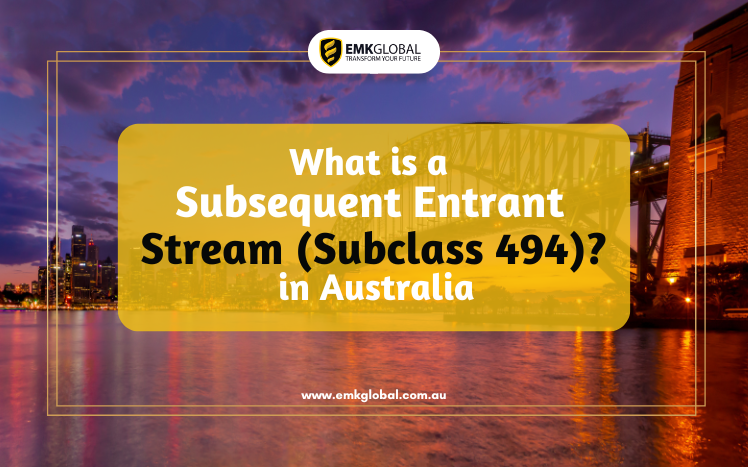Introduction
The Subsequent Entrant Stream under Subclass 494 visa is an avenue for family members of skilled employer-sponsored regional visa holders to join them in Australia. This article delves into the intricacies of this visa stream, outlining its conditions, eligibility criteria, application process, and more.
Conditions for Applying for Subsequent Entrant Stream
Applicants typically apply for the subsequent entrant stream concurrently with the main visa application. However, there are exceptions. For instance, if the family composition changes after the primary visa application, a separate subsequent entrant application may be required.
Eligibility Criteria for Subclass 494 Subsequent Entrant Stream
To qualify for the Subclass 494 Subsequent Entrant Stream, applicants must meet specific requirements:
- Age Limit: Applicants must be under forty-five years old.
- Family Sponsorship: Applicants must have a family member holding a Subclass 494 visa.
- Sponsor Nomination: They must be nominated by the sponsor of a skilled employer-sponsored visa holder.
- Job Position: Applicants must be nominated for a job listed in the Regional Occupation List or MLTSSL.
- Work Experience: A minimum of three years of relevant work experience is required.
- Skills Assessment: Applicants must obtain a positive skills assessment from a recognized authority.
- English Proficiency: Fluency in English is necessary, with specific score requirements in language tests like IELTS, TOEFL, or PTE.
English Language Proficiency Requirement
Applicants must demonstrate proficiency in English. Here are the required scores in different language tests:
- IELTS: 4.0 for each band
- TOEFL: Total score of 32 with no band less than 4.0
- PTE: Average score of 30 based on 4.0 for each band
Application Process for Subclass 494 Subsequent Entrant Stream
The application process involves several steps:
- Check Eligibility: Verify eligibility for the Subclass 494 Subsequent Entrant Stream.
- Obtain Nomination: Secure a nomination from the main visa holder’s sponsor.
- Gather Documents: Prepare all necessary documents for the application.
- Submit Application: Complete the application form, attach documents, and submit.
- Pay Fees: Pay the required visa fees.
- Await Decision: Wait for the Department of Home Affairs’ decision.
Processing Time for Subsequent Entrant Stream
The processing time varies but typically ranges from 12 to 14 months. Factors affecting processing time include the accuracy of information, document sufficiency, verification procedures, and application volume.
Professional Assistance for Migration
Navigating the migration process can be complex. Seeking professional help can ensure a smoother application process and enhance the chances of success.
Conclusion
The Subclass 494 Subsequent Entrant Stream offers a pathway for family members to join skilled employer-sponsored regional visa holders in Australia. Meeting the eligibility criteria, demonstrating English proficiency, and following the application process diligently are key to a successful application.
FAQs
Can I add my partner to my 494 visa?
- Yes, you can include your partner as a subsequent entrant if they meet the eligibility criteria.
What is the processing time for a subsequent entrant stream?
- On average, the processing time ranges from 12 to 14 months.
Who is eligible for a subsequent entrant stream subclass 494?
- Family members of skilled employer-sponsored regional visa holders meeting specific criteria are eligible.
Can I obtain permanent residency on a 494 visa?
- The 494 visa is a provisional visa; however, pathways to permanent residency may be available based on certain conditaions.
What are the benefits of a subsequent entrant stream?
- Subsequent entrants enjoy residency, work, study rights in regional Australia, access to public facilities, and potential pathways to permanent residency.


